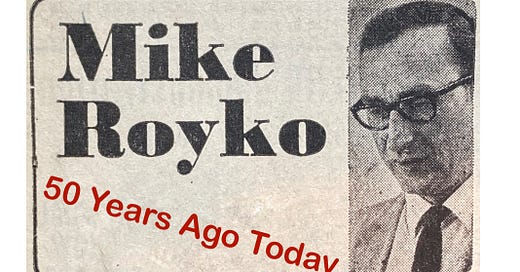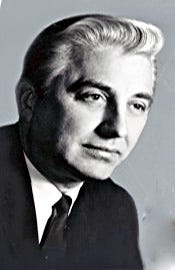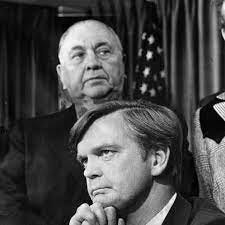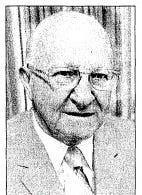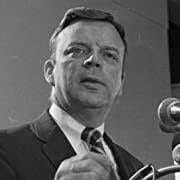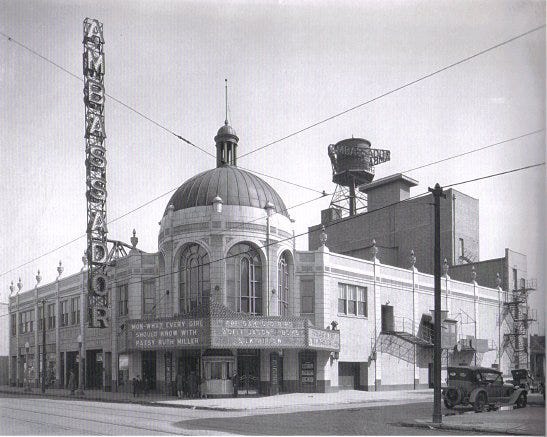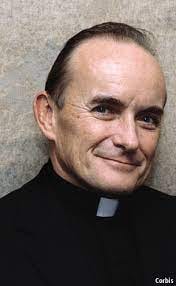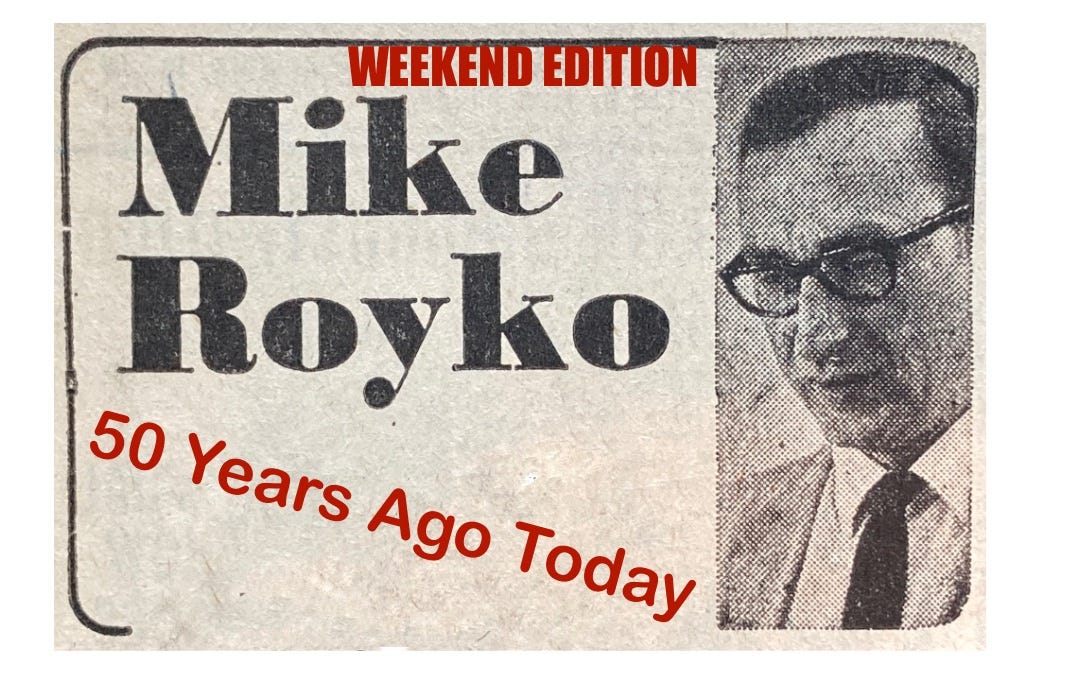Mike Royko 50 Years Ago Today: A rift in the space-time continuum--Mike admits he was wrong
Weekly Compilation December 6-12, 1971
To access other parts of this site, click here for the Home Page.
Why do we run this separate item, Mike Royko 50 Years Ago Today? Because Steve Bertolucci, the hero of the serialized novel central to this Substack, “Roseland, Chicago: 1972,” lived in a Daily News household. The Bertolucci’s subscribed to the Daily News, and back then everybody read the paper, even kids. And if you read the Daily News, you read Mike Royko. Read the daily Royko briefing Monday-Friday on Twitter, @RoselandChi1972.
December 6, 1971
A reporter who smiled
Today a rift in the space-time continuum: Mike admits he was wrong.
“Many years ago, I seriously misjudged a man. I sneered at his advice. I wrote him off as a loser.”
Mike was a young reporter working on a sensational murder case being run by the sheriff’s office because it happened in the suburbs. The sheriff was bungling the case, even losing the only real piece of evidence, which Mike says was “lost by one of his men while sweeping out the office.”
This sounds familiar to me but I can’t quite place it. I thought immediately it must be the Grimes sisters, the most sensational murder of the 1950s and investigated mostly under jurisdiction of the sheriff. Mike definitely covered the Grimes sisters. But I can’t find anything about a clue getting swept away. It isn’t the Schuessler brothers, because their murders happened in 1955, and Mike didn’t start at City News Bureau until either the very end of 1956, or the very beginning of 1957. If anybody knows which case this was, lemme know in comments or at RoselandChicago1972@substack.com.
In any case, as the sheriff talked with reporters about the case one day, Mike made a suggestion the sheriff didn’t like. They had words, it seems. Mike ended up telling the sheriff “not to drop any future clues on his foot.”
Then: “A more experienced reporter put away his notebook and sternly lectured me on the need for politeness and respect when dealing with our public officials.”
That older reporter now thumped the sheriff on the back and they “whispered words of mutual admiration.” Mike would see this reporter repeat the same behavior with more and more politicians, “even Paul Powell”.
“I decided then that, as experienced as he was, he would not go far if he kept acting indecently in public,” writes Mike.
But actually, the reporter left his newspaper and became a U.S. Representative. And now, he’s been slated by Mayor Daley’s Democratic Central Committee to run for the U.S. Senate. That veteran reporter “is none other than Roman Conrad Pucinski.”
“It’s too late now to change my ways,” Mike ends, “although I might give it a try…some of that racetrack stock may be left over.”
December 7, 1971
Simon passes a boss’s test
More on long-time U.S. Senator Paul Simon, before he was senator, always known as Mr. Good Government.
Last week, Mike wrote about governor-wannabe Dan Walker, who refused to ask for the Democratic Machine endorsement. He said it would be selling out to Mayor Daley. But future U.S. Senator Paul Simon, Mr. Good Government himself, was doing everything he could to get that endorsement, also for the governor’s race.
Simon told reporters that Walker’s comments were “Joe McCarthyism” trying to scare voters, and said he’d make “no commitment to anyone” for the Machine endorsement. This week, Mike tells us what happened in that slate-making committee when Simon went to ask for the endorsement at party headquarters in the Sherman House hotel.
There was one committee member Simon still had to convince: Matt Bieszczat, Democratic committeeman for the 26th ward centered around Ashland, Chicago and Division, the “old Polish” neighborhood as Mike says. He doesn’t even bother mentioning that Bieszczat is the ward’s former alderman, and is currently a Cook County Board Commissioner—because that is less important.
“Mayor Daley ranks him as the top Pole in the Machine’s inner circle,” writes Mike. Decades ago, Bieszczat started out by begging his ward boss for a job on a city garbage truck, and he learned how to get out the vote and keep that job.
“Daley trusts him because in all of Bieszczat’s years, he never once opened his mouth about a friend. He wouldn’t even open his mouth about an enemy,“ writes Mike. “Which is why [Bieszczat] still had doubts about the boyish, bow-tied Paul Simon, who wanted Bieszczat’s backing for governor.”
When Simon finished his pitch to the slating committee, Bieszczat read from a 1965 Harper's article bylined “By State Senator Paul Simon, as told to Alfred Balk” which “told of payoffs by lobbyists, profiteering in racetrack stock, the political muscle of the crime syndicate, and other juicy subjects.”
Then Bieszczat asked one question:“Did you say that?”
Mike: “Simon didn’t hesitate. ‘I was misquoted,’ he said.”
So Paul Simon got the Machine endorsement for governor, then made a speech about how “there were no strings attached to his candidacy, that he would be his own man.”
Mike calls Alfred Balk to confirm that Paul Simon read the article with his name on it before it was published. “ ‘I’m sure of it,’ said Balk.”
Mike concludes, “Let’s hope Simon doesn’t decide he was misquoted on many other things he said in the past.”
December 8, 1971
Jesse Jackson vs Hanrahan
Yesterday we heard the news report version of Jesse Jackson meeting with the real Mayor Daley in THIS CRAZY DAY IN 1972. If you missed it, check it out in the weekly compilation here. Today we hear Mike’s version.
News version, by Charles Nicodemus: Jesse Jackson met Daley in his private office at Democratic Central Committee headquarters in the Sherman House. Jackson told Daley he’d lead a movement to defeat State’s Attorney Ed Hanrahan if the party slates him to run for re-election.
Recall Hanrahan’s State’s Attorney police raided a Black Panther West Side apartment in 1969 in pre-dawn hours, killing leaders Fred Hampton and Mark Clark and wounding others. Hanrahan is under federal indictment for conspiracy to obstruct justice in the investigation of that raid. But he still wants to run for re-election.
Mike tells us Jackson “arrived in the morning, asked to see Daley, and had been ushered right in. No other civil rights leader bothered to try.” Mike doesn’t hesitate to criticize Jackson over other issues, so you know it impressed him that Jackson came to have it out with Mayor Daley. Mike says Daley listened politely to Jackson’s threat to lead a Black voter revolt if the party slated Hanrahan.
Daley “is always polite and attentive to men like Jesse Jackson and Martin Luther King. To their face at least,” writes Mike. He tells us how, while Daley meets in his office with the ward committeemen to slate all the candidates, Jackson and various others (including Mike) wait outside the door.
Jackson spent the long day “repeating his threat to the TV cameras and to the Machine’s black ward bosses as they arrived.” But Mike realizes as he hears various politicians talk to each other that no one else knows why Jackson is there.
“Jackson’s threat made so little impact on Daley, in fact, that Daley hadn’t even bothered to tell any of the party leaders about it…He didn’t mention it once.”
Finally the door to Daley’s office opened “and the party elders tripped out, in single file…They are the tiniest, funniest looking men you have ever seen….After the first seven, I always expect to see Snow White.”
Last, Daley emerged and read the list of slated candidates as Jesse Jackson “stood on the outer fringe of the crowd of newsmen.” Daley announced Hanrahan’s slating. Mike agrees with Jackson that it’s a slap in the face of Black voters. But, he says, from a political POV, Daley slated Hanrahan just because he knows Hanrahan can win.
“Daley’s Negro aldermen and legislators went along with the choice, although they whined to Jackson in private that they didn’t like it…Remember, Hanrahan’s legal troubles came because his men killed a couple of Black Panthers and shot up several others. Since when is killing black militants politically unpopular in white Cook County?”
Mike says we’ll see a different Hanrahan as long as he’s under indictment. “No more wild rages, temper tantrums or making of vomiting noises at columnists he dislikes. No more finding people guilty in the press...As Hanrahan said…about his own indictment, ‘a person is innocent until proven guilty.’”
“I’ll buy that,” says Mike. “And I’m still wondering what Fred Hampton and Mark Clark were guilty of. It must have been very serious for them to be sentenced to such a quick death.”
December 9, 1971
Rockne thrown for loss by fans
Mike tells the tale of the Rockne movie theater in Austin, at 5825 W. Division.
“It began in 1967, when Arthur Ehrlich bought the place,” says Mike. According to cinematreasures.org, the Rockne was originally the 2500-seat Ambassador Theatre, built in 1924 and designed by Harold E. Gallup. It was renamed for famed Notre Dame football coach Knute Rockne after he died in a 1931 plane crash.
“At first [Ehrlich] showed the usual ‘G’ rated movies…And in July of this year, to use the phrase of the more modest generation, Ehrlich went all the way. He began showing those 16-mm. films, which have actual scenes of you-know-what.”
“People in the neighborhood were outraged and they organized against him…leaders of the Northwest Austin Council stomped into his office and demanded that he change his policies.”
Mike sometimes glides over background details, so I looked it up for a bit more: A November 28 , 1971 Tribune article by young Clarence Page says the Northwest Austin Council, led by Mrs. Jeanine Stump, “picketed the theater for three weekends in July and August after sending a group of adult members inside to scout the current films, advertised as ’16 millimeter from San Francisco.’”
Ehrlich agreed to run family movies, volunteering to also cut prices, and even offered $10 family weekly passes. The Council said it would give Ehrlich a list of 2,200 local families who wanted family films at the Rockne. They said 700 families would take the passes, and he mailed out applications.
Last week, “decent, clean movies finally returned to the Rockne Theater. His first double-feature was ‘A Man Called Horse’ and ‘Little Big Man,’ both of which received excellent reviews when they first came out,” writes Mike. “They replaced a couple of 16 mm films….which contain scenes I would not even discuss with my old first sergeant.”
And you know how tickets sales went?
“Lousy,” says Mike.
“’We’ve made the move,’ Ehrlich said. ‘Now where are all the people? What do people want?’” Mike has the answer: “What do they want? You know what? I think they want you-know-what.”
By the way, I guess we all know young Clarence Page worked hard and went on to a great career at the Tribune as an editorial board member and syndicated op-ed columnist. Quick story: I met Clarence Page once many years ago, as a journalism student who somehow got into a party at Abe Peck’s Lincoln Park highrise party room.
And I thought about that tiny encounter when I read Page’s terrific column this morning, as I always do whenever I read him. Because how you treat people means something, that’s why. I’ve never forgotten how I didn’t even have a right to be at that party, but I ended up in a small cluster of people in a hallway discussing some hot topic.
I think we didn’t agree on the topic perhaps, or not entirely. Clarence Page listened to mine and everyone’s ideas with genuine interest. As the group broke up we introduced ourselves to each other, and I was shocked to hear that this guy who acted like a regular person with no special right to the biggest opinion was a member of the Tribune editorial board. I think that is about the highest compliment you can give a person. It’s not the kind of thing you say “thanks” for at the time, so a belated thanks today to Clarence Page.
December 10, 1971
One from the road
Today Mike runs one of his regular columns of “Letters, calls, complaints and great thoughts from readers:”
“Patricia Kelly, Chicago: At last, somebody has put you in your place. Thank the Lord for men such as Father Andrew Greeley. I read his article about you and your vicious attacks upon Mayor Daley.”
“It is men like Mayor Daley, Edward Hanrahan and Father Greeley who have made this city great, not people like you. I only hope that Father Greeley runs for office some day as Father Lawlor did, so I have an opportunity to vote for him. It’s easy to sit on the sidelines and criticize, but the men in Mayor Daley’s organization do something.”
Mike’s Comment: “They sure do. Bernie Neistein, one of the mayor’s top ward bosses, did enough to be indicted the day after he helped put together next year’s county ticket. But that’s what makes this city great. They’re always doing something, and once in a while they even get caught.” (See the November 9 post, “Neistein Indicted” in the weekly compilation of THIS CRAZY DAY IN 1972.)
You know who Mayor Daley is. The others mentioned by Patricia Kelly:
Father Francis X. Lawlor (1917-2013) was a Southwest Side priest who became alderman in 1971 for one term, with the goal of stopping racial change and white flight in the neighborhoods he represented. While Father Lawlor’s intentions may have been good—he was correct that re-segregation rather than integration was taking place in those neighborhoods—he was widely considered racist, because he advocated policies that would hinder Black Chicagoans from moving to certain areas.
Fr. Andrew Greeley (1928-2013) was a Catholic priest and University of Chicago sociologist, who also made so much money writing books including racy novels that he lived in the John Hancock and donated a million dollars, more than once, to charitable endeavors.
According to the National Catholic Register, Fr. Greeley had “the dirtiest mind ever ordained.” A Greeley word cloud would be heavily dominated by “cantankerous.” You’d think he and Mike Royko would be pals, but no. They definitely rubbed each other the wrong way.
Rick Kogan and Jerry Crimmins’ obituary of Mike Royko says, “One of his principal critics was the writer and Catholic priest Rev. Andrew Greeley, who once described the content of Royko’s columns as ‘crudity mixed with resentment.’”
Writing a profile of Greeley in the New York Times in 2010, James Warren wrote “The columnist Mike Royko once derided him as ‘an intellectual priest who dabbles in journalism’ and a ‘thin-lipped, constipated quivery twerp.’”
I can’t get the Greeley piece excoriating Mike that Patricia Kelly enjoyed so much in time for this post, because it wasn’t in the Tribune and so is not accessible digitally. But I hope to find it for a future post exploring the Mike Royko-Fr. Greeley feud. There’s plenty of other material for that post, even if I don’t find that particular piece. Sneak peek: Greeley did not like “Boss.”
As we here all know, weekends could be sad for a Daily News family because Mike Royko wasn’t in the Daily News’ single weekend edition. So we look for Mike elsewhere on weekends.
Today, it’s Bernie Neistein Day.
Background:
In December 3’s column “Meet your slatemakers,” Mike said he didn’t understand why governor wanna-be Dan Walker refused to ask for the endorsement of Mayor Daley’s slate-making committee. “He says some of these men are unsavory characters, and he doesn’t want to associate with them,” wrote Mike, and then described all the committee members.
One member was state Sen. Bernard S. Neistein, aka 29th ward boss Bernie Neistein, but I only quoted a short phrase of Mike’s on Neistein due to space. This week, Neistein got indicted as part of the Governor Otto Kerner-era shady racetrack stock that so many Illinois politicians made a huge profit on. For the full post, see November 9 in the weekly compilation of THIS CRAZY DAY IN 1972.
In that coverage, the Daily News took credit for telling the Sangamon County State’s Attorney that Neistein has 1,557 shares of stock in the Fox Valley Trotting Association held in his wife’s maiden name. Neistein says the stock is worth maybe $4,800 and he considered it a “risky nebulous investment.” The News says it should be worth $20,000.
If Neistein gets convicted, he wouldn’t go to jail, but he’d get kicked out of office. But Neistein has already said he won’t run again. And his prosecution will be hampered because all the Illinois Racing Board records from Otto Kerner’s years as governor have disappeared, which was discovered the same day Neistein got indicted. (Again, see the weekly compilation of THIS CRAZY DAY IN 1972.)
The Neistein stories in all the papers reminded us that Neistein lives in the fancy Carlyle at 1040 N. Lake Shore Drive, ten miles away from his actual district which includes the impoverished West Side where he grew up. Somehow THAT open secret never got Neistein thrown out of office, and I have no idea why.
So, it seems like the right time to share more Mike on Neistein, starting with Mike’s entire paragraph on Bernie in his December 3 column:
“Neistein owns racetrack stock too, but doesn’t everyone? Neistein runs a black ghetto ward, although he doesn’t live there. He has never been accused of anything more serious than taking orders from Chuckie English, of the crime syndicate. He once got English some used county furniture at bargain prices. What’s a friend for?”
I’d love to also include every Neistein allusion from Mike’s Daily News and Sun-Times columns, but none of the News columns are accessible digitally, so they’re not searchable. The Sun-Times digital archives begin in 1986, and as we all here know, Mike left that paper in 1984 after Rupert Murdoch bought it, so nothing there.
Oddly, the Tribune archives show only one reference to Bernie during Mike’s years there, from a conversation with Slats Grobnik on Feb. 5, 1986. So we’ll have to settle for that.
Slats finds it hilarious that the U.S. is sending a team of observers to make sure an election in the Philippines is run straight. Mike pretends not to understand the humor, and Slats gives him examples of what goes on in Chicago elections, including:
“What about Bernie Neistein? Remember when he was running a West Side ward? He came into party headquarters after an election and griped that one of his precinct captains was dumb enough to come in with something like 310 to nothing. Bernie told the guy to give a Republican two votes so he wouldn't have the FBI snooping around."
By the way, this feature is no substitute for reading Mike’s full columns. He’s best appreciated in the clear, concise, unbroken original version. Mike already trimmed the verbal fat, so he doesn’t need to be summarized Reader’s Digest-style, either. Our purpose here is to give you some good quotes from the original columns, but especially to give the historic and pop culture context that Mike’s original readers brought to his work. You can’t get the inside jokes if you don’t know the references. Plus, many columns didn’t make it into the collections, so unless you dive into microfilm, there are some columns covered here you will never read elsewhere. If you don’t own any of Mike’s books, maybe start with “One More Time,” a selection covering Mike’s entire career and including a foreword by Studs Terkel and commentaries by Lois Wille.
Do you dig spending some time in 1972? If you came to MIKE ROYKO 50 YEARS AGO TODAY from social media, you may not know it’s part of the book being serialized here, one chapter per month: “Roseland, Chicago: 1972.” It’s the story of Steve Bertolucci, 10-year-old Roselander in 1972, and what becomes of him. Check it out here.
To get MIKE ROYKO 50 YEARS AGO TODAY in your mailbox weekly along with THIS CRAZY DAY IN 1972 and new chapters of the book—
SUBSCRIBE FOR FREE!

